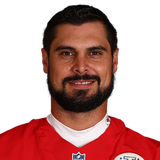
Week Under Review: Concussion protocol remains unreliable after Matt Moore's hit
In the second quarter of the Dolphins’ 30–12 loss to the Steelers, quarterback Matt Moore fell victim to charging linebacker Bud Dupree, who illegally pounded his helmet into Moore’s jaw, forcing the quarterback’s head to jerk back as his body crumbled to the ground.
Moore lay there, in what appeared to be so much pain that being placed in concussion protocol seemed to be a best-case scenario. But just as soon as fans came to grips with the improbable idea that third stringer T.J. Yates would be tasked with saving the trailing Dolphins, Moore came back into the game, missing just one snap—one! Despite being hit in the jaw (one of many catalysts to brain injury) Moore was cleared to play faster than you can say “Concussion protocol? What concussion protocol?”
Dolphins coach Adam Gase offered little clarification after the loss. “He saw the guy and even came back and said he should have just taken the sack,” Gase said. “When they told me he was coming back in, I started talking to him and he was good. They went through the league’s deal and then our trainers; he cleared everything.”

Moore very well may have escaped a concussion, but the process to determine that felt more like rolling through a stop sign than anything that would qualify as a deliberate medical examination. In 2013, as part of its enhanced concussion protocol, the league released its thorough baseline and post-injury concussion assessment test. While answers can now be recorded on a tablet to speed up diagnosis (or lack thereof), the NFL estimates the assessment process takes between eight and 12 minutes. Moore was back in the game before the assessment app could even be loaded.
No doubt, millions of viewers were thinking how on Earth could Moore return to the game when thirty seconds prior he seemed more destined for an ambulance than back in the pocket? CBS reporter Tracy Wolfson’s report that a concussion was ruled out because Moore was hit in the jaw was less than satisfactory; anyone who’s suffered headaches from a clenched jaw understands that the jaw is part of the head. On top of that, viewers saw Moore’s head snap back en route to landing on the ground.

But almost as egregious as a possible concussion left undiagnosed was the response from CBS analyst Phil Simms, who was calling the Dolphins-Steelers game: “They would not let him back in the game if there was any doubt.”
There are any number of absolute statements to make in this world—Aaron Rodgers is on fire, Meryl Streep is not overrated—but “wink, wink, trust the NFL when it comes to brain trauma” is preposterous. It is not Simms’s, or any media member’s, place to act as a mouthpiece for the league on this issue. There has been too much litigation, too many drive-through concussion “assessments” (Cam Newton, for example), too many blind eyes turned (Case Keenum, for example) and too many other bungled “protocols” (Deflategate and myriad domestic violence issues, for example) to inherently trust the NFL on anything.
Wolfson is the sideline reporter, there to report what she observes or in this case, what the team feeds her. Simms is the analyst—he is supposed to provide perspective and contemplate the game’s preeminent storylines. When he fails to understand rules or suggests a team down by 17 with 5:00 left in a game should punt, that’s mockworthy. When he blanketly decrees that we should trust the league when it comes to diagnosing concussions, that’s dangerous and dishonest. Simms’s archaic, uninformed attitude is just a microcosm of the league’s historic lack of nuance of this issue.
Since the NFL added unaffiliated neurological consultants in 2013, the league says reported concussions have risen, most recently by 31% last season. Yet the policy remains fuzzy and suspicious. How can you reconcile Moore so hastily being back in that game after getting massacred, not to mention Thomas Rawls’s speed walking through his concussion protocol Saturday after his head slammed in the turf?
The only absolute about the NFL is that it remains one of life’s most dangerous professions, and no version of a “concussion protocol” seems to unequivocally place a priority on medical opinions when there is a game to win. Especially in the playoffs.
